|
|
TODAY.AZ / Arts & Entertainment
Gobustan. Best vacation spot for history buffs
29 July 2020 [15:17] - TODAY.AZ
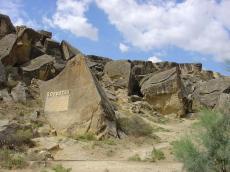
By Azernews
By Laman Ismayilova
There's nothing better than traveling somewhere beautiful with a rich history. If you like traveling to places injected with a touch of history, make sure you visit Gobustan.
Settled since the 8th millennium BC, this historical site is peppered with some of the world’s best-preserved and most atmospheric prehistoric remains.
Here you can explore some of the most iconic stone structures set in the cradle of ancient civilization.
Gobustan State Historical Reserve is home to over 600,000 pethroglyphs. These stone and iron-age figures were carved thousands of years ago and are now considered a UNESCO World Heritage Site.
The ancient rock carvings were discovered in 1939 at the foot of the mountain Djingirdagh and on the top of Yazili Tepe.
Norwegian ethnographer Thor Heyerdahl (1914-2002) began forming Scandinavian ancestry hypothesis after visiting Gobustan.
He suggested that Scandinavian ancestry could be traced to the country now known as Azerbaijan. The ethnographer recognized local boats petroglyphs as the oldest known images of pirogue in the world.
These vessels, similar to the old Scandinavian ships, prompted him to make sensational hypothesis statement about the connection between Norwegians and Azerbaijanis.
Now Gobustan is a real open-air museum, visited by thousands of people from all over the world.
Here's a list of few things all travelers have a chance to enjoy while visiting Gobustan State Historical Reserve.
Eye-catching petroglyphs
Gobustan rock carvings have their own unique charm. Most of them depict primitive men, animals, battle-pieces, ritual dances, bullfights, boats with armed oarsmen, warriors with lances in their hands, camel caravans, pictures of celestial bodies. Among the carvings also pictures of fish, snake, lizard and insects were recorded.
For rock carvings, people in Gobustan used stone tools such as scrapers, pebble and flint tools for cutting out images.
The percussion tools were found in Kaniza site. The edges of percussion tools were blunted as a result of carving pictures on rocks.
The most ancient engravings were made using the techniques of cutting out on a rock with stone and a deep incise.
Charming Musical Stone
Apart from petroglyphs, there is also another unique discovering known as Gaval Dash.
The Gaval Dash is a natural musical stone which can only be found in Gobustan. The musical stone is called Gaval Dash as its sound can be compared to a tambourine.
The "Mystery of Gavaldash" is quite simple: the marks on the stones show that they were struck in places that protruded in some way into the air, and could thus reverberate. In such a way, when this porous limestone was hit one could hear various sounds.
A number of Azerbaijani musicians have used Gaval Dash to create wonderful music pieces.
The musical stone and the Yall? chain-dance was also featured in the interval act of the semi-final of Eurovision Song Contest 2012 held in Baku.
Ana Zagha Shelter
Ana Zagha shelter is home to over 200 rock carvings. At the beginning of the excavation, the archeologists noticed only bull flock images at the upper part of the rock; however with further excavations, carvings of humans armed with arrow and bow were discovered in the lower part.
The rock No.31b is located inside the Ana Zagha shelter. Here you can enjoy the images of aurochs, goat, horse and human figures. Notably, aurochs petroglyph approximately dates back to the 18th-15th millennium B.C.
Mud Volcanoes
And now let's whirl through some of the most incredible, sometimes mind-boggling phenomena Gobustan can offer to its curios visitors.
Mud volcanoes are some of the most unique natural phenomenon on Earth.
Azerbaijan has the highest number of mud volcanoes in the world. Some 350 out of over 1,000 mud volcanoes in the world are located here.
On September 5, 2004 the greatest mud volcano in the territory of Azerbaijan was added into the Guinness World Records.
The mud volcanoes located in Gobustan National Park are definitely worth seeing.
Every 20 years or so, volcano ignites and its flame height can reach hundreds of meters.
The lava, mud, and liquid spewed by mud volcanoes are used as raw materials for chemical and construction industries, as well as pharmacology.
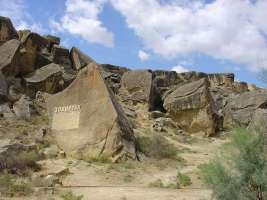
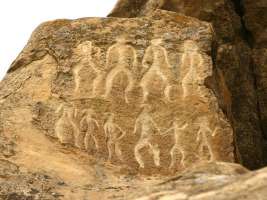
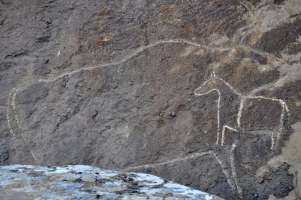
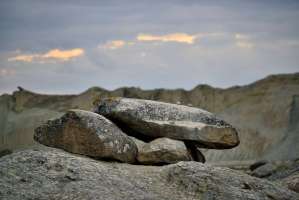
URL: http://www.today.az/news/entertainment/195889.html
 Print version
Print version
Connect with us. Get latest news and updates.
See Also
- 23 May 2025 [13:19]
Azerbaijani literature corner opens at Tajikistan National Library - 22 May 2025 [15:33]
National Art Museum's visitors enjoy Belarusian traditional palace feasts - 22 May 2025 [15:25]
Program of My Azerbaijan Int'l Festival announced - 22 May 2025 [11:48]
Shusha to host Children's Art Festival on Children's Day - 21 May 2025 [15:38]
Carpet Museum to presents new project 'Knots of Time' - 20 May 2025 [18:12]
Azerbaijan Cultural Center unveils Seyid Azim Shirvani Auditorium at Uzbek University - 20 May 2025 [13:12]
Azerkhalcha opens carpet exhibition "Harmony of Beauty: Timeless elegance of Azerbaijani carpets" for first time in Moldova - 20 May 2025 [12:03]
Azerbaijan State Academic Opera and Ballet Theater presents new project - 20 May 2025 [11:02]
Surakhani Ship-Museum hosts next round of 'Battle of Artists' - 19 May 2025 [18:00]
Renowned photographer describes 'Mexican Dolls' exhibition as visual dive into Mexican traditions
Most Popular
 Corruption in Armenian: how Cash from Yerevan became the “voice of Europe”
Corruption in Armenian: how Cash from Yerevan became the “voice of Europe”
 As peace nears between Baku and Yerevan, lobbying noise grows louder
As peace nears between Baku and Yerevan, lobbying noise grows louder
 Russia working to create buffer zone along Ukrainian border, Putin confirms
Russia working to create buffer zone along Ukrainian border, Putin confirms
 Azerbaijan, Iran wrap up successful “Araz-2025” military drill
Azerbaijan, Iran wrap up successful “Araz-2025” military drill
 Israel's envoy praises Azerbaijan’s commitment to diplomatic safety
Israel's envoy praises Azerbaijan’s commitment to diplomatic safety
 Azerbaijan never demolished religious sites on its territory - Fuad Akhundov for Italian press
Azerbaijan never demolished religious sites on its territory - Fuad Akhundov for Italian press
 Europe turns to Türkiye for security as US retreats from global stage
Europe turns to Türkiye for security as US retreats from global stage
